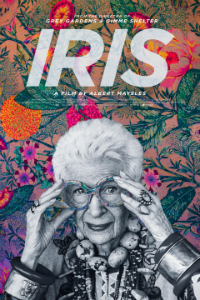Summer Hours: In Life’s Twilight, Maysles Looks at a Late Life Fashion Icon and Finds Love in Work, Marriage & Stuff
 Watching Iris, a light-hearted profile of the self professed ‘geriatric starlet’ of New York City costume couture, Iris Apfel, one could not help but think of two things – the singular oddness of the Beales of Grey Gardens bleeding through a port hole of performative cinema history into the life an oddball worthy of comparison, and the massive gaping hole left by the loss of the man who managed to immortalize them all as silver screen legends – the incomparable Albert Maysles who tragically died just last month at age 88.
Watching Iris, a light-hearted profile of the self professed ‘geriatric starlet’ of New York City costume couture, Iris Apfel, one could not help but think of two things – the singular oddness of the Beales of Grey Gardens bleeding through a port hole of performative cinema history into the life an oddball worthy of comparison, and the massive gaping hole left by the loss of the man who managed to immortalize them all as silver screen legends – the incomparable Albert Maysles who tragically died just last month at age 88.
It’s impossible not to concentrate on the many moments in acknowledgement of his presence behind the camera – the casually tender moments when Iris, then 92, introduces Albert to her friends and colleagues, lovingly acknowledging his own legacy and public persona, or when she offers him lunch or tea, politely offering sustenance to a new friend and household fixture, or in its final heartbreaking frames, where Al sits beside his subject before the camera as an equal. Our memories still tender, the moments hurt a bit, but he was a filmmaker known for his direct cinema roots whose presence within his own work remains essential to the artworks themselves.
Iris is no different. Though the film embraces the addition of tonally propulsive non-diegetic music, Maysles’s tried and true loose observational style remains the same. He and his small crew, including Nelson Walker III and the increasingly salient Sean Price Williams, follow Apfel and her witty, though progressively weakening, 100 year old husband through their still busy lives, purchasing clothes, visiting photoshoots or fashion shows, and setting up gallery exhibitions of her immense collection of designer costume wear throughout some of the most prestigious galleries in the US.
Much like the Beales, the Apfel household is compacted with memories both personal and worldly, here in the form of patterned fabrics from Iris’s former life as a renowned interior designer or countless bedazzled frocks from around the globe. Her collection sprawls not only throughout her expansive NYC loft, but several other vacation homes and a hefty storage facility, each piece bearing its own memories and wild character. Decked to the technicolor nines, draped with layers of jewelry, and forever sporting her enormous hoola-hoop framed glasses, Iris herself echoes the outlandishly dressed Little Edie, always concerned with her looks before the camera, yet wildly unafraid to voice her opinion on any given subject, from plastic surgery to the ethics of withholding medical facts from her own husband.
But while much of Al’s final portrait is refracted through the lens of Grey Gardens and features a woman obsessed with playing dress up, Iris is not so much a reflexive inquiry into the nature of charactorial performance as it is an admiring study of what a life of hard work compiled in clothing and supported by true love looks like.
Iris and her husband Carl have lived a long, passionate, and adventurous life and still most obviously care deeply for one another, as evidenced by their constant back and forth, their affectionate hand holding and several adorable photos of them kissing, wrinkled lips all. Iris, in its relatively simple depiction of a life lived to its fullest with nearly a century’s worth of perspective, is deceptively complex. Often funny thanks to its subject’s quick intellect, self confident depreciation and singular view into the world of fashion, it remains both a tender love story and rather ominous inquisition, reminiscent of Olivier Assayas’s masterful Summer Hours, into what one does with a life’s worth of things when one’s body leaves them behind.
★★★½/☆☆☆☆☆


